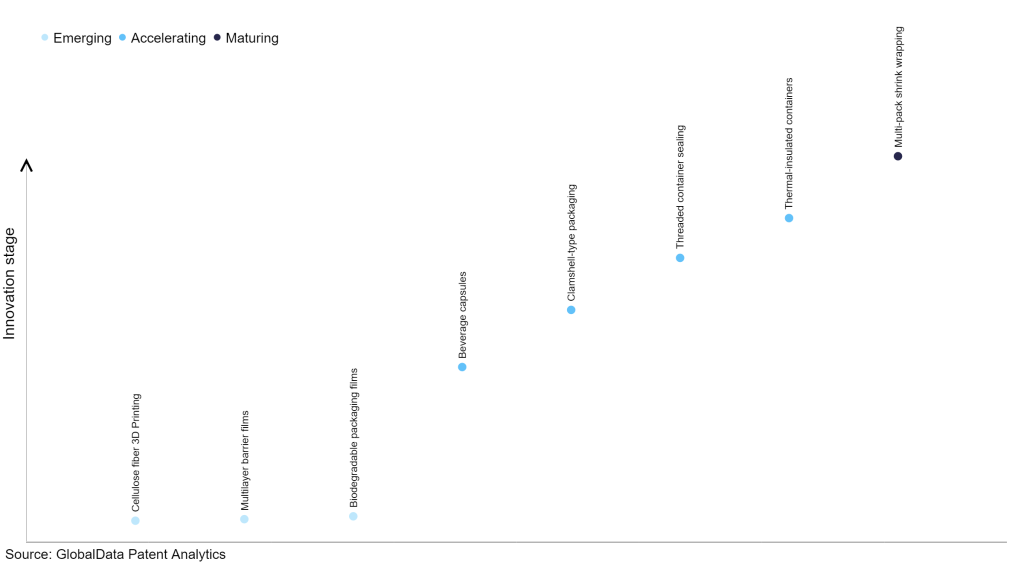The packaging industry continues to be a hotbed of patent innovation. Activity is driven by convenience, experience seekers, and multipurpose suitability, and the growing importance of technologies, such as near-field communication, Internet of Packaging, and bio-degradable packaging. In the last three years alone, there have been over 18,000 patents filed and granted in the packaging industry, according to GlobalData’s report on Innovation in packaging: multi-pack shrink wrapping. By the report here.
However, not all innovations are equal and nor do they follow a constant upward trend. Instead, their evolution takes the form of an S-shaped curve that reflects their typical lifecycle from early emergence to accelerating adoption, before finally stabilizing and reaching maturity.
Identifying where a particular innovation is on this journey, especially those that are in the emerging and accelerating stages, is essential for understanding their current level of adoption and the likely future trajectory and impact they will have.
30+ innovations will shape the packaging industry
According to GlobalData’s Technology Foresights, which plots the S-curve for the packaging industry using innovation intensity models built on over 83,000 patents, there are 30+ innovation areas that will shape the future of the industry.
Within the emerging innovation stage, cellulose fiber 3D Printing, multilayer barrier films, and biodegradable packaging films with energy recovery are disruptive technologies that are in the early stages of application and should be tracked closely. Beverage capsules, clamshell-type packaging, and threaded container sealing are some of the accelerating innovation areas, where adoption has been steadily increasing. Among maturing innovation areas are thermal-insulated containers and multi-pack shrink wrapping, which are now well established in the industry.
Innovation S-curve for the packaging industry

Multi-pack shrink wrapping is a key innovation area in packaging
Shrink wrap bundling is the process of making a pack of multiple items or products. It enjoys the advantage of affordability; hence it is considered as a popular choice compared to other packaging materials. Shrink wrap takes minimal space, and keeps bundled items close together without the need for additional bulky materials.
GlobalData’s analysis also uncovers the companies at the forefront of each innovation area and assesses the potential reach and impact of their patenting activity across different applications and geographies. According to GlobalData, there are 110 companies, spanning technology vendors, established packaging companies, and up-and-coming start-ups engaged in the development and application of multi-pack shrink wrapping.
Key players in multi-pack shrink wrapping – a disruptive innovation in the packaging industry
‘Application diversity’ measures the number of applications identified for each patent. It broadly splits companies into either ‘niche’ or ‘diversified’ innovators.
‘Geographic reach’ refers to the number of countries each patent is registered in. It reflects the breadth of geographic application intended, ranging from ‘global’ to ‘local’.
Patent volumes related to multi-pack shrink wrapping
Source: GlobalData Patent Analytics
Graphic Packaging is the leading patent filer in multi-pack shrink wrapping. Some other key patent filers in multi-pack shrink wrapping include Westrock, Barry-Wehmiller Companies, Otsuka and Kimberly-Clark.
Graphic Packaging leads the pack in terms of application diversity, while Westrock and Otsuka stood in second and third positions, respectively. By means of geographic reach, Otsuka holds the top position, followed by Colgate-Palmolive and Kimberly-Clark.
Multi-pack shrink wrapping gives the company advantage of increased storage space in warehouses, is lightweight, protects against environmental damage, and provides a cost-efficient option. Hence, it would be an essential part of the packaging industry in the coming years.
To further understand the key themes and technologies disrupting the packaging industry, access GlobalData’s latest thematic research report on Packaging.
Data Insights
From

The gold standard of business intelligence.
Blending expert knowledge with cutting-edge technology, GlobalData’s unrivalled proprietary data will enable you to decode what’s happening in your market. You can make better informed decisions and gain a future-proof advantage over your competitors.



